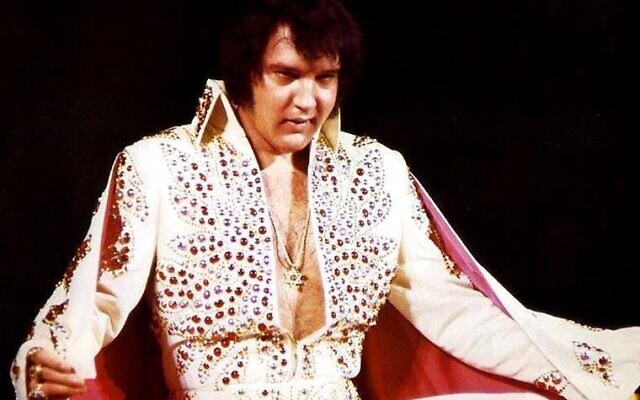Elvis had Jewish blood – but his mum told him to keep shtum about it
Priscilla takes centre stage in Sofia Coppola’s eponymous movie, while 'The King' is the subject of an exhibition in London
Sofia Coppola’s movie Priscilla, about life with Elvis as told through the tarantula-lashed eyes of his titular ex-wife, has caused fury among his fan base and dismay in his estate, resulting in an awkward absence of any Elvis music in the film.
Their rage is levelled as much at Priscilla as at Coppola, as she enthusiastically endorsed the film (based on her memoir, Elvis & Me, co-written with Jewish author Sandra Harmon). It exaggerates his flaws and failings, yet ignores his spirituality and his search for life’s meaning through alternative religions, including Judaism, which played a part in his life from a young age.
In the summer of 1954, when 19-year-old Elvis Presley received a freshly-pressed copy of his first record, That’s All Right, he had nothing to play it on. The $50-a-month-rent for the family’s flat in Alabama Avenue, a lowly Memphis enclave nicknamed ‘The Pinch’, meant they could barely afford essentials, let alone a record player.
Unfazed, the teen who would be ‘King’ ran upstairs to Rabbi Alfred Fruchter’s apartment and played it on his turntable, the one on which he played his cantorial music.
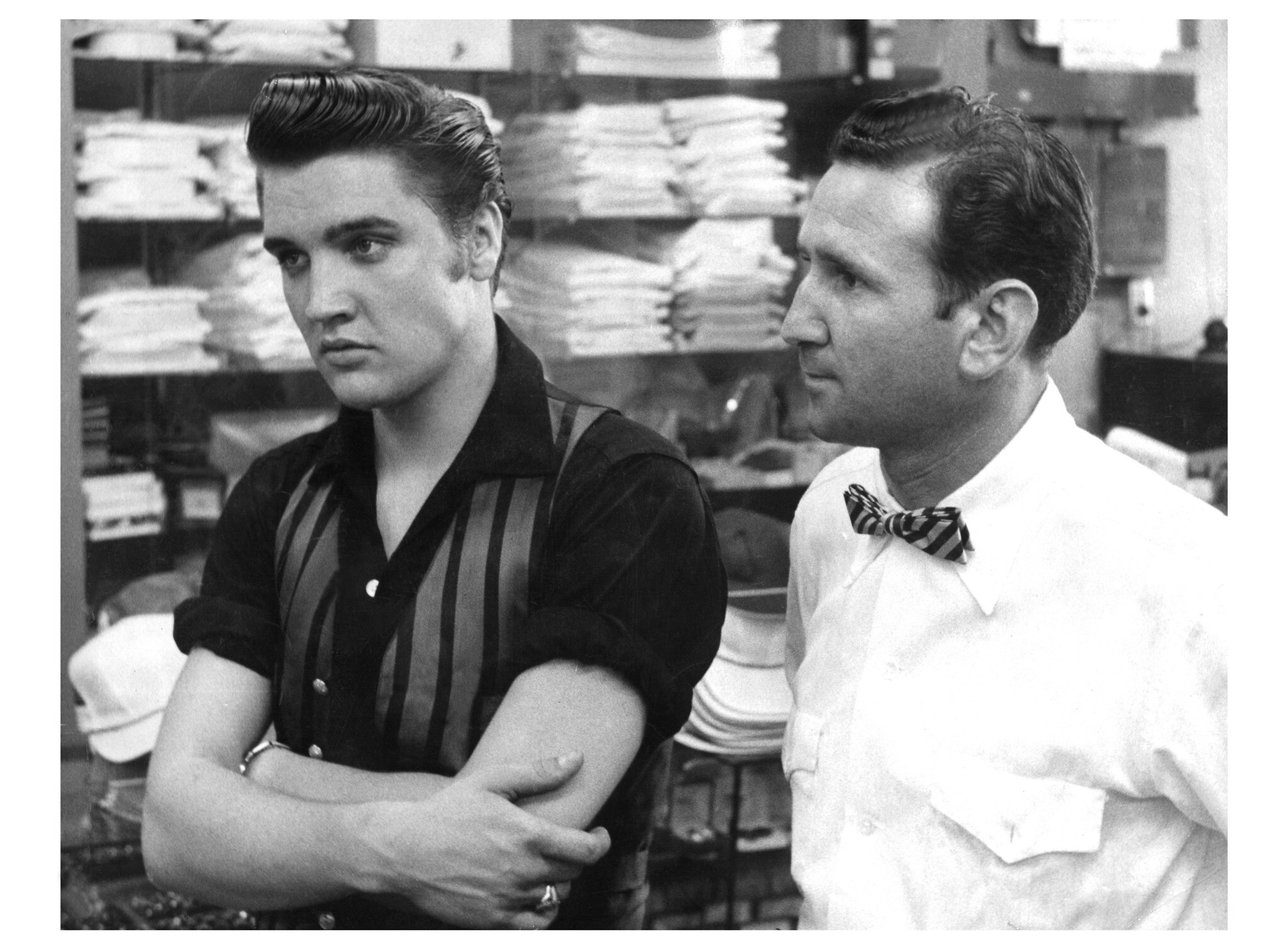
The Fruchter family, in a similar situation to the Presley family in that their flat was a step towards better things, were fond of Elvis and his mum Gladys, who’d pop up for cake with Alfred’s wife, Jeanette. Elvis even acted as their Shabbos goy and when offered payment, would refuse. Sometimes he’d join the family for Friday night dinner wearing the kippah they gave him.
Elvis never forgot their kindness and when the rabbi appeared years later at one of his concerts asking to see him, he was invited backstage where Elvis bear-hugged him and took him to a press conference, introducing him as ‘his rabbi’.
Professor Roselle Chartock, author of The Jewish World of Elvis Presley, says that when Gladys told Mrs Fruchter that she was worried about Elvis’s future prospects, she prophetically said: “Don’t worry, he’s a good boy, he’ll make you proud someday.”
This affinity with his Jewish neighbours and, at around the same time, with Bernard Lansky, a stalwart of Memphis’ Jewish merchants community who sold ‘cool threads’ (hip/trendy clothes) and spoke Yiddish with a southern drawl, has raised the question as to whether there was more than just mutual admiration going on.
And now, with an exhibition in London stirring up huge interest in Elvis nearly 50 years after his death, the answer is all the more keenly sought. A treasure trove of Elvis’ personal possessions, plus costumes worn by Austin Butler in Baz Luhrmann’s 2022 Elvis movie, are on display at the Direct From Graceland exhibition, exquisitely curated by keeper of the King’s things, archivist Angie Marchese.
There’s much enthusiasm for the theory that Elvis had Jewish heritage, driven by the story told by Chartock that Gladys sat Elvis down while quite young and told him he had Jewish blood, then added: “But I don’t want you to tell people, because people don’t like Jews.”
Bernard Lansky had noticed a shabby kid hanging around the window of his Beale Street shop, not just because he was scruffy, but because he was white. “Beale was a rough, tough street and home to mainly African Americans many of whom were our customers,” said Bernard’s son, Hal Lansky, when I visited the famous Memphis store last year. “Elvis stood out like a sore thumb.”
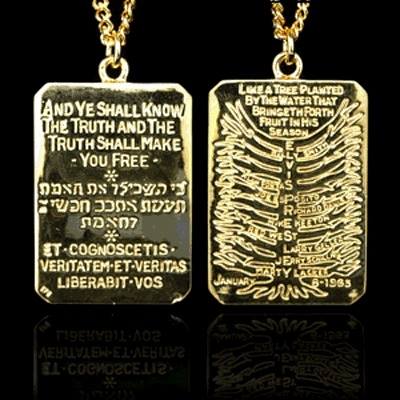
Still, Bernard ushered him inside as though he were one of his VIP customers, among them BB King and Little Richard. An unlikely friendship was forged and Elvis patronised Lansky’s for 30 years. “I put Elvis in his first suit and I put him in his last,” said Bernard, referring to the white suit and blue tie his dear friend was buried in.
Elvis struck up many relationships with Jews: songwriters, directors, costume designers, jewellers and Alfred Wertheimer, the photographer who created the now-sanctified series of candid, monochrome photos of Elvis on the brink of mega-stardom at 21 – an incredible record of a life-altering three months, forever frozen in time.
In 2018 Angie Marchese, vice president of archives and exhibitions at Elvis Presley’s Graceland, happened upon the gravestone that Elvis designed for his mother in 1964, six years after she died in 1958. It was placed in storage after Elvis died on 16 August, 1977 (many believe by Elvis’ father, Vernon, known for his anti-Semitic leanings, which infuriated Elvis) and hadn’t seen the light of day since.
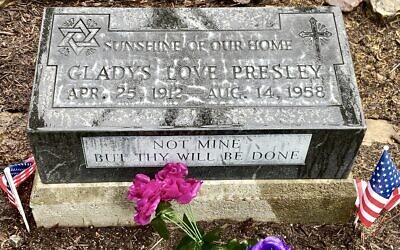 “It existed,” Angie says, “but I’d never seen it. It was among thousands of items as you can imagine, but suddenly there it was. Elvis had it carved with a cross and with a Star of David to honour Gladys’s Jewish heritage. The stone was broken but I had it restored and added it to Graceland’s Memorial Garden to mark the 60th anniversary of her death.”
“It existed,” Angie says, “but I’d never seen it. It was among thousands of items as you can imagine, but suddenly there it was. Elvis had it carved with a cross and with a Star of David to honour Gladys’s Jewish heritage. The stone was broken but I had it restored and added it to Graceland’s Memorial Garden to mark the 60th anniversary of her death.”
Elvis changed the spelling of his middle name from Aron to Aaron and regularly wore his bejewelled Star of David and chai pendants on stage. Memphis Mafia member Marty Lacker, another close Jewish friend, told author Alanna Nash, in her 1995 book Elvis Aaron Presley: Revelations from the Memphis Mafia, that Elvis wore the chai “to cover all bases” after exploring different religions to his own Baptist-Pentecostal one and that he’d joke that he didn’t want to be kept out of heaven on a technicality.
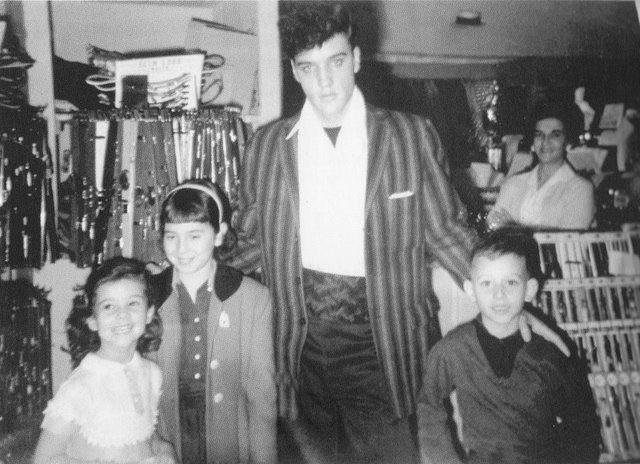
One of the most compelling pieces of this pedigree puzzle is the appearance in various Presley family trees of Nancy Burdine, a European Jew. Tracing Elvis’ lineage for her book, Elvis & Gladys, author Elaine Dundy discovered Nancy’s daughter was Martha Tackett who married Mansell White and had a daughter called Octavia or ‘Doll’. Doll married Bob Smith and they had a daughter, Gladys Love Smith – Elvis’ mum. Dundy, who credits Elvis’s third cousin, Oscar Tackett with this information, then searched through five generations of women from Nancy and ended up at Elvis, indicating his descent from a direct line of Jewish women.
Who knew? Well, at the time, hardly anyone. However, Elvis did and later told several people – including Jewish friends George Klein, Alan Fortas and Larry Geller, all of whom became part of his inner circle.
Roselle Chartock sums up: “The words ‘Elvis’ and ‘Jews’ may not seem to go together. But the truth is that, despite growing up in a poor, fundamentalist Christian family in the Deep South – an area sometimes known for its antisemitism – Elvis Presley developed a deep affinity to Jews. I believe the main reason goes back to that day when Gladys told [him] about their Jewish blood.”
Tickets for Direct From Graceland are available at elvislondonbridge.co.uk
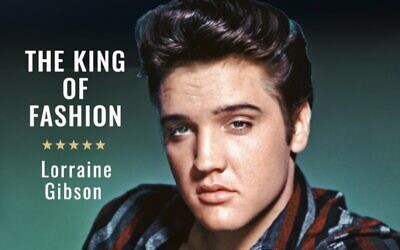 Elvis: The King of Fashion by Lorraine Gibson with foreword by Hal Lansky is out this summer (White Owl Books).
Elvis: The King of Fashion by Lorraine Gibson with foreword by Hal Lansky is out this summer (White Owl Books).
ELVIS SHMELVIS
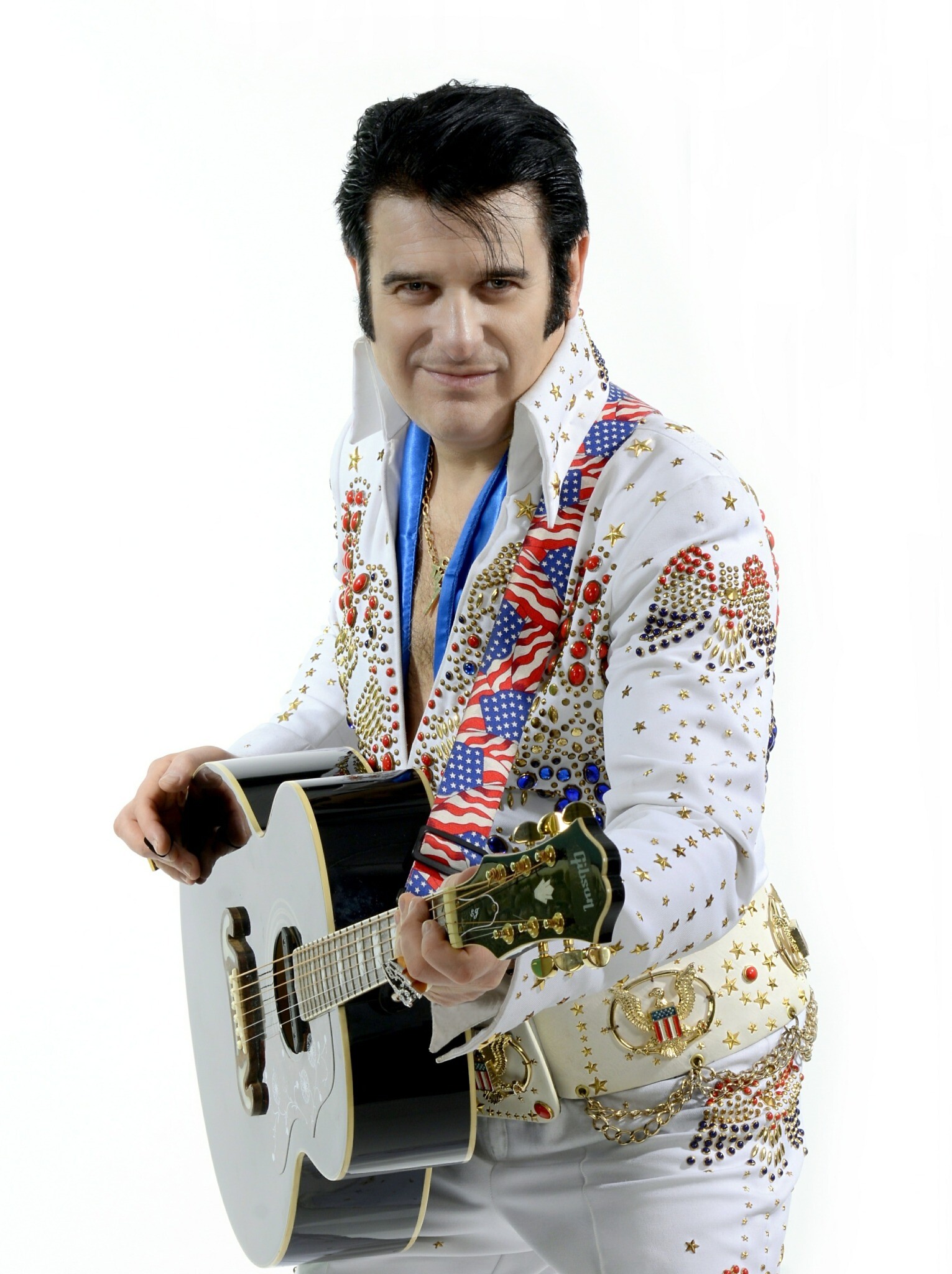
By day, he’s Martyn Dias from St Alban’s, but once he pulls on his bespoke spangled jumpsuit, raven-black wig and bejewelled gun-slinger belt, he is Elvis Shmelvis, one of the UK’s best-rated Elvis tribute acts – and certainly the number one Jewish version. He rocks an impressive simulation of The King’s voice, making him in demand to get all shook up at weddings, birthdays and barmitzvahs. He fully endorses the theory that Elvis was Jewish. “I’ve been in touch with Larry Geller, Elvis’ hairdresser and spiritual adviser, who said that he confided in him about his Jewish ancestry,” says Martyn. shmelvis.com

Thank you for helping to make Jewish News the leading source of news and opinion for the UK Jewish community. Today we're asking for your invaluable help to continue putting our community first in everything we do.
For as little as £5 a month you can help sustain the vital work we do in celebrating and standing up for Jewish life in Britain.
Jewish News holds our community together and keeps us connected. Like a synagogue, it’s where people turn to feel part of something bigger. It also proudly shows the rest of Britain the vibrancy and rich culture of modern Jewish life.
You can make a quick and easy one-off or monthly contribution of £5, £10, £20 or any other sum you’re comfortable with.
100% of your donation will help us continue celebrating our community, in all its dynamic diversity...
Engaging
Being a community platform means so much more than producing a newspaper and website. One of our proudest roles is media partnering with our invaluable charities to amplify the outstanding work they do to help us all.
Celebrating
There’s no shortage of oys in the world but Jewish News takes every opportunity to celebrate the joys too, through projects like Night of Heroes, 40 Under 40 and other compelling countdowns that make the community kvell with pride.
Pioneering
In the first collaboration between media outlets from different faiths, Jewish News worked with British Muslim TV and Church Times to produce a list of young activists leading the way on interfaith understanding.
Campaigning
Royal Mail issued a stamp honouring Holocaust hero Sir Nicholas Winton after a Jewish News campaign attracted more than 100,000 backers. Jewish Newsalso produces special editions of the paper highlighting pressing issues including mental health and Holocaust remembrance.
Easy access
In an age when news is readily accessible, Jewish News provides high-quality content free online and offline, removing any financial barriers to connecting people.
Voice of our community to wider society
The Jewish News team regularly appears on TV, radio and on the pages of the national press to comment on stories about the Jewish community. Easy access to the paper on the streets of London also means Jewish News provides an invaluable window into the community for the country at large.
We hope you agree all this is worth preserving.


